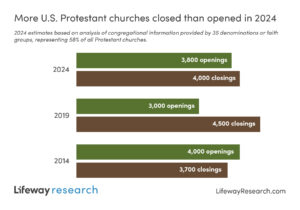The Baptist Paper
A new report from George Barna and the Cultural Research Center at Arizona Christian University reveals a dramatic shift in America’s spiritual landscape, “with a significant decline in Christian affiliation, a rise in non-Christian faiths and “no-faith” segments, and widespread confusion about moral truth,” according to an ACU news release.
The study found that Christian affiliation dropped from 72% in 2020 to 66% in 2025 — a decline equating to a loss of roughly 15 million adults over five years. Meanwhile, non-Christian faiths have surged: Buddhism grew by 56%, Judaism by 21%, and Islam by 12%, with all non-Christian faiths combined increasing by 39% since 2020.
Barna cautioned that while these growth rates appear large, those numbers are somewhat exaggerated because of the small base associated with each faith group, but the trend is clear — “Christianity is slowly shrinking at the expense of competing faith systems.”
The “no-faith” segment — those disassociating from any religious belief — rose from 20% in 2020 to nearly 23% in 2025, totaling 60 million adults.
This group now outnumbers Catholics, traditionally the largest church-related segment, with a 10% growth over the half-decade showing no signs of slowing.
Parallel concern
A parallel concern is the rejection of absolute moral truth, with 66% of U.S. adults denying its existence — a figure unchanged from 2020. Among non-Christian faith groups, rejection of moral absolutes varies, currently at 67%, while the no-faith segment saw a rise from 68% to 77%. Within Christian groups, mainline Protestants rejecting absolute truth increased to 61%, and 69% of Catholics dismiss it. Born-again Christians showed improvement, with rejection dropping from 57% in 2020 to 49% in 2025.
The study explored how Americans determine truth, revealing a lack of consensus. Only 44% of adults — despite two-thirds identifying as Christian — cite God and the Bible as their basis for truth. Other sources include scientific facts (25%), personal certainty (13%), public consensus (5%), and laws (5%). Among faith segments, Pentecostal (78%), evangelical (73%), and born-again Christians (73%) most often name God and the Bible as their truth source, compared to 65% of non-denominational Christians, 58% of mainline Protestants, and 48% of Catholics.
When asked to list published sources of “consistent, relevant, and reliable truth,” 59% chose the Bible — far surpassing alternatives like the Koran, Book of Mormon, Torah, or Nietzsche’s Beyond Good and Evil (each at 5%), Plato’s Five Dialogues (4%), the Wiccan Book of Shadows, The Communist Manifesto, and the Humanist Manifesto (each at 3%). Yet this conflicts with the 44% who claim God and the Bible as their primary truth basis, highlighting inconsistency.
8 truth sources
The survey identified eight truth sources, with personal feelings topping the list: 74% of adults rely on emotions to discern moral truth. Other sources include the Bible (44%), public policies (41%), scientific claims (40%), cultural norms (39%), non-biblical philosophies (24%), personal experience (21%), and peer input (18%).
Despite the Bible’s popularity as a truth source, only 18% of adults consistently rely on it for moral guidance.
Baby Boomers (ages 60–70s) are most likely to prioritize Scripture, with 26% consistently turning to it, compared to 20% of Gen X (ages 40s–50s), 12% of Millennials (ages 22–40), and 9% of Gen Z (ages 18–21). Asian-Americans were least likely to identify as Christian (42%) but most likely to rely on the Bible (21%), while Blacks were least likely (13%). Women are more likely than men to prioritize Scripture (20% versus 16%). Among faith groups, Pentecostals (47%), evangelicals (44%) and born-again Christians (43%) most often prioritize Scripture, compared to 34% of non-denominational Christians, 30% of mainline Protestants, and 12% of Catholics.
Barna attributes this confusion to the lack of strict boundaries in determining truth.
“Two out of three adults believe truth is conditional, and more than four out of five Americans are comfortable drawing from multiple sources or bases of truth,” Barna explained. “Even people who generally believe the Bible or the God of the Bible are the most reliable sources of moral truth admit that it is common for them to make their moral choices based on feelings, laws, traditions, peer pressure, social standards, science, or ease.”
Syncretism
Barna links this moral turbulence to the dominant worldview in America — Syncretism.
“As sad as this state of affairs may be,” Barna commented, “it is predictable and understandable. The dominant worldview in America is Syncretism, an eclectic and highly personalized mixture of the sacred and the secular, embraced by nine out of 10 adults. Possessing a worldview that thrives on relativism and the flexibility of its core beliefs certainly fosters the ‘all sources are legitimate’ route to moral decision-making.”
He suggests that churches, families, and schools advocate for absolute moral truth rooted in biblical principles.
“With a minority of Americans believing that the God of the Bible is real and reliable, and an even smaller number reading the Bible during a typical month, it’s no wonder there is such moral turbulence in our culture,” Barna continued. “Everyone becomes his or her own arbiter of truth, and without absolutes, there is little sense that there is a ‘right’ answer to discover, or to have ideas about how to figure it out if there were such a definitive reality.”
Barna’s research has guided Christian leaders for over four decades. A professor at ACU, director of R\research at the CRC and a senior research fellow at the Family Research Council’s Center for Biblical Worldview, he has authored more than 60 books, including his latest, Raising Spiritual Champions. His work has been cited by major media and has informed strategies for churches, ministries and organizations like the U.S. military.
The full report is available at www.arizonachristian.edu/culturalresearchcenter.
EDITOR’S NOTE — This story was written by the Cultural Research Center at Arizona Christian University.








